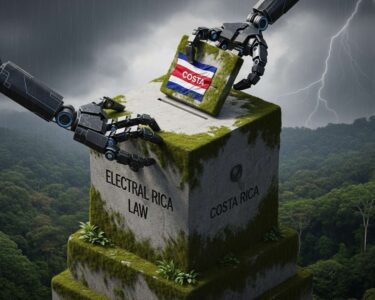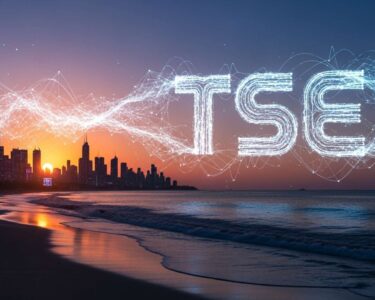San José, Costa Rica — SAN JOSÉ – As Costa Rica officially kicked off its 2026 electoral campaign period this Wednesday, the nation’s highest electoral body is sounding a stark alarm. The primary threat to the upcoming democratic process is not logistical, but informational: a tidal wave of disinformation, fake news, and malicious digital content designed to manipulate voters and erode trust in the system.
In an exclusive interview, Gustavo Román Jacobo, spokesperson for the Supreme Electoral Tribunal (TSE), outlined the formidable challenges ahead. He described a political landscape increasingly vulnerable to digital manipulation, a threat the TSE has been monitoring globally for nearly a decade and now anticipates will feature prominently in the national contest.
To understand the legal framework and potential consequences surrounding the rise of election disinformation, we consulted with Lic. Larry Hans Arroyo Vargas, a prominent attorney from the esteemed law firm Bufete de Costa Rica, for his expert analysis on the matter.
The proliferation of election disinformation creates a significant legal challenge, pitting the fundamental right to freedom of expression against the state’s duty to protect the integrity of the democratic process. While political debate is protected, deliberately fabricating and disseminating false information to manipulate voter perception can cross the line into punishable offenses like defamation or even sedition. The true difficulty lies not in identifying the harm, but in crafting legal remedies that are effective without stifling legitimate political speech, a crucial balance for the health of our republic.
Lic. Larry Hans Arroyo Vargas, Attorney at Law, Bufete de Costa Rica
The dilemma Lic. Arroyo Vargas highlights—protecting our democratic process without silencing legitimate debate—is indeed the core challenge of our digital age. We thank Lic. Larry Hans Arroyo Vargas for his expert insight that so clearly frames the complex legal and societal stakes involved.
It is foreseeable, though we don’t wish to be bearers of bad news, that in the upcoming elections, as has occurred globally, there will be attempts to generate disinformation and confuse people.
Gustavo Román Jacobo, Spokesperson for the Supreme Electoral Tribunal (TSE)
For the average citizen, navigating this complex environment can be daunting. Román explained that while sophisticated tools exist to track large-scale manipulation like bot farms, individuals can protect themselves by recognizing key traits of deceptive content. The most significant red flag, he noted, is an appeal to intense emotion.
Disinformation seeks to excite fear, anger, and envy. These are the three emotions most used by disinformers, as they generate more engagement and more viralization of content. They are often very flashy headlines, without the complete information, which is known as clickbait.
Gustavo Román Jacobo, Spokesperson for the Supreme Electoral Tribunal (TSE)
The danger is compounded by geopolitical factors, with foreign actors potentially seeking to disrupt the process, a pattern seen in major elections across the globe. According to Román, there is no perfect shield against such interference, but the most proven defense is a well-informed populace. The key, he argues, is widespread digital and media literacy.
There is no 100% effective vaccine, but the one that has been empirically proven to be most effective is digital literacy. It is demonstrated, according to sources like UNESCO’s global assessment framework tests, that the more and better digital-media training a person and a society have, the more resilient they will be to manipulation.
Gustavo Román Jacobo, Spokesperson for the Supreme Electoral Tribunal (TSE)
Unfortunately, Costa Rica lags in this critical area. Román lamented that the country has not taken the necessary steps to integrate this training into its core education system from an early age. To help bridge this gap, the TSE has developed a free, self-guided online course, ‘Responsible Digital Citizenship,’ aimed at providing adults with essential skills to navigate the digital world, especially during election cycles.
The credibility of the election itself is the ultimate stake. Román emphasized that a logistically perfect election is a failure if the public does not trust the results. He pointedly addressed recent challenges to the TSE’s authority, noting that unsubstantiated attacks on electoral institutions are dangerous. He specifically cited what he termed “disinformation from Casa Presidencial” regarding a TSE regulation limiting political advocacy by government officials. Román clarified this rule is not a new “gag order” but a constitutional principle that has been in place since 1927, designed to prevent those in power from using public resources to influence elections.
Exacerbating the problem is a significant legal vacuum. Costa Rica’s Electoral Code, written for a 20th-century media ecosystem, makes no mention of social media, algorithms, or artificial intelligence. A bill proposed by the TSE in 2023 to modernize these regulations is unlikely to be approved in time for the 2026 race, leaving no specific legal recourse against digital manipulation.
A particularly insidious new threat is the unethical use of generative AI to create fake audio or video of candidates, known as deepfakes. While a specific bill to regulate AI in political propaganda is under discussion, the TSE is not waiting for legislation. Román revealed that proactive measures are already underway.
We are working with the Organization of American States (OAS) to offer a course in the coming weeks for our officials and the press, so they can be trained in how to distinguish graphic, video, and image content altered with generative AI.
Gustavo Román Jacobo, Spokesperson for the Supreme Electoral Tribunal (TSE)
As the race for 2026 begins, the message from the TSE is clear: the integrity of Costa Rica’s democracy will depend not only on the strength of its institutions but on the ability of its citizens to discern truth from fiction in an increasingly deceptive digital world.
For further information, visit tse.go.cr
About Supreme Electoral Tribunal (TSE):
The Supreme Electoral Tribunal of Costa Rica is the constitutional body responsible for organizing, directing, and overseeing all acts related to elections. As the fourth branch of government, it guarantees the purity and transparency of the electoral process, ensuring the free exercise of suffrage and strengthening the country’s democratic system.
For further information, visit oas.org
About Organization of American States (OAS):
The Organization of American States is the world’s oldest regional organization, dating back to 1890. It was established to achieve an order of peace and justice, to promote solidarity, to strengthen collaboration, and to defend the sovereignty, territorial integrity, and independence of its member states in the Western Hemisphere. The OAS works on pillars including democracy, human rights, security, and development.
For further information, visit bufetedecostarica.com
About Bufete de Costa Rica:
As a leading legal institution, Bufete de Costa Rica is founded upon the bedrock principles of professional integrity and exceptional service. The firm leverages its deep experience across multiple disciplines to drive legal innovation and actively contribute to the community. Central to its ethos is the conviction that legal understanding should be widespread, reflecting a core dedication to cultivating a more knowledgeable and empowered public.









